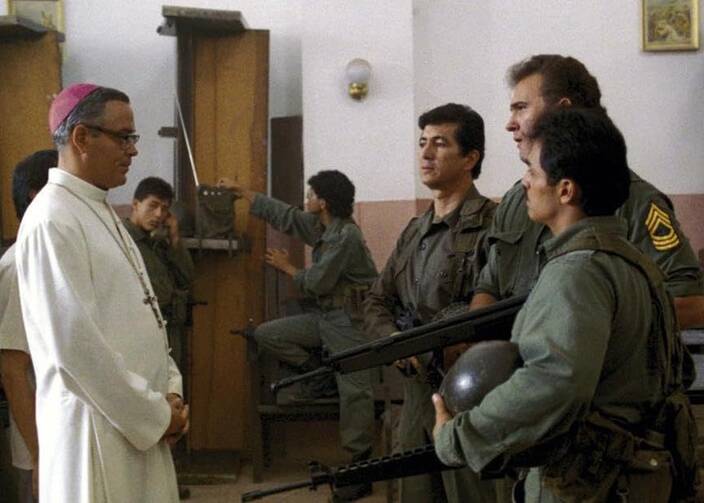Óscar Romero (Raul Julia), the archbishop of San Salvador, stands in the church of an occupied town. Heavily armed soldiers are using the church as a garrison, a twist on the moneylenders Jesus encountered in the temple. Despite threats, abuse and machine gun fire, Archbishop Romero leads his people into the church for Mass. Standing before the bullet-scarred crucifix, he says:
You should know that you have not suffered alone, for you are the church. You are the people of God. You are Jesus, in the here and now. He is crucified in you just as surely as he was crucified 2,000 years ago on that hill outside of Jerusalem. And…your pain and your suffering, like his, will contribute to El Salvador’s liberation and redemption.
If you know the story of St. Óscar Romero, whose feast day is March 24 (which was Palm Sunday this year), you know how the film ends: with martyrdom. The paradox at the heart of Christianity is that we must die in order to live again. At no time is that truth more apparent than Holy Week, when we follow Christ to the cross and witness his resurrection at Easter. And few movies witness to that truth like “Romero” (1989).
“Romero” was produced by Paulist Productions, a company founded in 1960 by the Paulist priest Edward “Bud” Kieser with the goal of creating films that “uncover God’s presence in the contemporary human experience.” This was the first time a Catholic company had produced a major feature film. Helmed by Australian director John Duigan and written by John Sacret Young, “Romero” tells the story of St. Óscar’s career as archbishop, his growth into a prophetic voice for an oppressed people and his murder at the hands of the state. When we first meet Romero, he is a bookish and inoffensive prelate who has been appointed archbishop of San Salvador to be an apolitical figurehead. But when his friend, the Jesuit Rutilio Grande (Richard Jordan), is murdered for his prophetic work fighting for the rights of the poor, Romero becomes a courageous voice for liberation, eventually leading to his own martyrdom.
The historical context is the Salvadoran Civil War, a bloody period of unrest that stretched over a decade. Tens of thousands of civilians were killed or “disappeared” by the government. Romero and Grande were hardly the only martyrs: The same year Romero was killed, the Salvadoran military also killed four American churchwomen, and mere months after the film was released, a U.S.-trained government death squad killed six Jesuits and two laywomen at the University of Central America in San Salvador.
But the lessons of “Romero” are not chained to that particular moment in history. Oppression, occupation, war and violence continue to ravage our world in Palestine, in Ukraine and in many other places around the world. Prophetic voices for peace and liberation are as necessary today as they were in his time. As we journey through Holy Week, recalling Christ’s own suffering and death at the hands of a repressive government, we might ask: How is God calling us to witness to the Gospel in our world today? In the film, we see Romero incur social and, eventually, physical costs for pursuing justice. What are the fears that keep us from speaking up, the justifications that make us blind to the crosses our neighbors carry? The world seems to be in a constant state of Passion. What must we do to bring about new life?
It is important to note that “Romero” is not just a film about an activist; it is about a saint. The film testifies to the urgent need to work for peace and justice in the here and now, but it also reminds us that these efforts are not ours alone. When we live out the Gospel, God works through us to reconcile the world.
Romero expresses this best late in the film, during what we might consider his Gethsemane moment. Falling to his knees before the grave markers of Rutilio Grande and his murdered companions, Romero offers a prayer of dependence on and trust in God. This week, as we draw near to the cross and consider where we will go from the empty tomb, maybe his prayer should be ours as well:
“I can’t. You must. I’m yours. Show me the way.”
“Romero” is streaming on Tubi.








